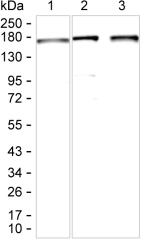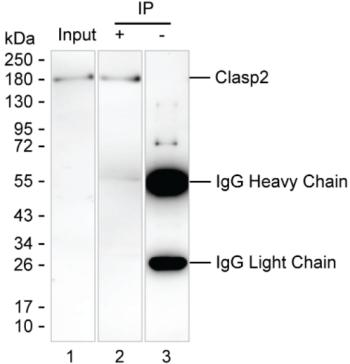

| WB | 咨询技术 | Mouse, Human |
| IF | 1/100-1/200 | Mouse, Human |
| IHC | 咨询技术 | Mouse, Human |
| ICC | 技术咨询 | Mouse, Human |
| FCM | 咨询技术 | Mouse, Human |
| Elisa | 咨询技术 | Mouse, Human |
| Host/Isotype | Rat IgG2b |
| Antibody Type | Primary antibody |
| Storage | Store at 4°C short term. Aliquot and store at -20°C long term. Avoid freeze/thaw cycles. |
| Species Reactivity | Mouse, Human |
| Immunogen | Purified recombinant fragment of mouse Clasp2 |
| Formulation | Purified antibody in PBS with 0.05% sodium azide |
+ +
以下是3篇关于Clasp2抗体的参考文献及其摘要概述:
---
1. **文献名称**:*CLASP2 interacts with p120-catenin to regulate microtubule dynamics at adherens junctions*
**作者**:Watanabe, T., Noritake, J., Kaibuchi, K.
**摘要**:该研究揭示了Clasp2通过与p120-catenin相互作用,在细胞黏附连接处调控微管动态的机制。利用特异性抗体进行免疫沉淀和共聚焦显微镜观察,发现Clasp2在维持上皮细胞极性和迁移中起关键作用。
---
2. **文献名称**:*Distinct roles of CLASP1 and CLASP2 in microtubule stabilization and Golgi organization*
**作者**:Mimori-Kiyosue, Y., Grigoriev, I., Lansbergen, G., et al.
**摘要**:研究通过Clasp2抗体进行功能缺失实验,发现Clasp2特异性参与高尔基体周围微管的稳定,而Clasp1主要影响细胞边缘的微管。结果提示Clasp家族成员在空间分工上存在差异。
---
3. **文献名称**:*CLASP2 deficiency causes intellectual disability: Developmental impacts on neuronal connectivity*
**作者**:Pla, R., Stanchi, F., Martínez, E., et al.
**摘要**:该研究利用Clasp2敲除小鼠模型及抗体标记,发现Clasp2缺失导致神经元树突发育异常和突触连接缺陷,揭示了Clasp2在智力障碍相关神经发育疾病中的潜在作用。
---
4. **文献名称**:*CLASP2 promotes cancer cell invasion by linking microtubules to invadopodia formation*
**作者**:Stehbens, S.J., Wittmann, T.
**摘要**:通过Clasp2抗体的免疫荧光和活细胞成像,研究发现Clasp2在癌细胞侵袭伪足(invadopodia)形成中调控微管与细胞膜间的信号传导,促进肿瘤转移。
---
这些文献涵盖了Clasp2在细胞骨架调控、神经发育及癌症中的功能研究,均通过Clasp2抗体进行关键实验验证。如需具体DOI或年份,可进一步补充。
The Clasp2 antibody is a crucial tool in studying the CLIP-associated protein 2 (Clasp2), a microtubule-associated protein involved in regulating cytoskeletal dynamics. Clasp2. part of the CLASP family, plays roles in mitosis, cell migration, and intracellular transport by stabilizing microtubules and linking them to cellular structures like the cell cortex or kinetochores. It interacts with CLIP-170. EB1. and other proteins to coordinate microtubule growth, capture, and stabilization during processes such as spindle orientation and cell polarization.
Antibodies against Clasp2 are widely used in cell biology research to visualize its subcellular localization via immunofluorescence or assess expression levels through Western blotting. They help investigate Clasp2's functional roles in development, neuronal morphogenesis, and cancer, where dysregulation is linked to mitotic defects, metastasis, or chromosomal instability. Species-specific Clasp2 antibodies (e.g., human, mouse, rat) enable cross-disciplinary studies in model organisms. Recent research also explores Clasp2's involvement in neurological disorders, such as Alzheimer's disease, due to its role in maintaining neuronal microtubule networks. Commercial Clasp2 antibodies are typically validated for specificity, often targeting conserved regions like the N-terminal TOG domains or C-terminal coiled-coil motifs. Proper controls, such as knockout cell lines, are essential to confirm antibody reliability in experimental settings.
×